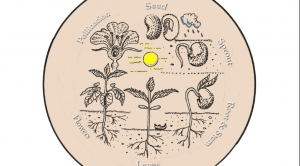Originally Published on the ECOreport
By Roy L Hales
May 25, 2015 (San Diego’s East County) - Alicia Previn’s new book, Give Bees A Chance, was written for children. Though most of the words are simple, the author also uses more sophisticated terms that she is confident younger readers will pick up by context. Her passion comes through every page, because Alicia Previn has worked closely with gardens, insects and the earth for most of her life. Gives Bees A Chance was written for children, but the message is for all of us.
 Are You Hungry?
Are You Hungry?
She starts with a description of one of the most basic needs on our planet:
“Are you hungry? Imagine your favorite things to eat. The whole world is a very big place with millions and billions of people that are also very very hungry. We go to a market or a restaurant to buy food that is grown and produced by farmers from the wide areas in the world that have good growing conditions. There are lots of hungry mouths to feed so the farmers try to grow as much as they can, which means fields are full of plants as far as the eye can see. Plants need to be fed too. They need some of the same things we need to live like water, food, sunshine, air and friends like the friendly creatures that help them grow.”
That is where bees come. One of the book’s more delightful illustrations shows a bee covered with pollen. As the author explains, the pollen they carry from plant to plant “transforms the flowers into food-producing plants that will also make new seeds so we can continue to plant and eat.”
The Child Has To Touch It
Previn deliberately put a picture of a bee on the top corner of every page. “That means the child has to touch it every time they turn the page,” she explained during our interview. It is meant to help them lose their fear of being stung.
She also addresses this phobia with words:
“Bees can be scary when they’re buzzing around, but if you think how small they are and how big you are, then you can understand that they can get scared if you start waving your hands around and start screaming. The best thing you can do is to stand very still, be calm and then walk slowly away. They do not want to hurt you.”
You won’t find terms like “monoculture,” “indicator species” or “colony collapse disorder” in Give Bees A Chance, but Previn tells her young audience that bees “are in big trouble.”
“When bees are in trouble that is a sign warning us that we must stop what we are doing and fix what is going wrong. There are many things making them sick, even the food they are pollinating is not healthy and can have diseases. The air and water around them are hurting them, as many farmers are spraying chemicals on the huge fields of plants to keep off bugs that eat and spoil the crops they sell to markets. The chemicals also take the life out of the ground, and we now know plants need this to grow strong and be good for our food to nourish us so we too can be healthy.”
Modern Mono-crop Agriculture
She returned to the idea that modern mono-crop agricultural methods are weakening plants during the course of our interview. “We are taking away the topsoil, which is the skin of life that the earth needs.” When you clear millions of acres and plant a single crop, they are far more vulnerable to bug infestation and disease than they would be in nature. This is because once a bug “figures out the key” to a plant, they are able to “open it on all of them.” They are “unhealthy and being artificially propped up by fertilizers.”
Disturbing as the massive bee die-offs is, it is an illustration of what we are doing to our planet, and ourselves.
She added, “There is a growing movement of people who that are planting diverse plants, thereby creating areas where they are trying to bring the soil back to life.”
A Growing Movement
In the Earthworm Book, Previn describes the creature who builds the soil, “which is why they are one of the most important species on the whole earth.” She contends that the first farmers would not have been able to produce enough to feed their communities if earthworms didn’t transform dirt into “rich, healthy living soil that helps plants grow and bloom, providing everyone with food.”
Give Bees A Chance goes to the next level. Bees pollinate plants so they become fruitful. It is well worth reading, for adults as well as children.
To Read more, or obtain copies of Alicia Previn’s books, go to her website: http://www.theearthwormbook.com/








Recent comments